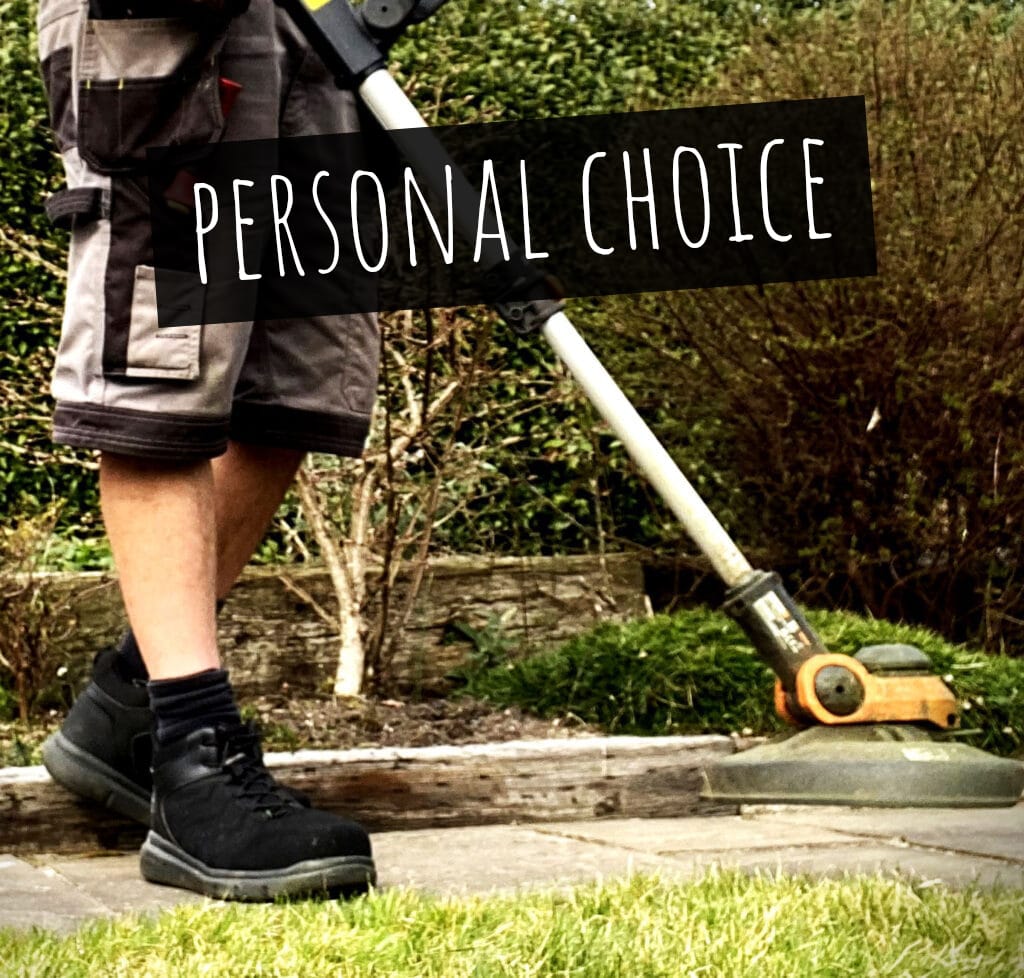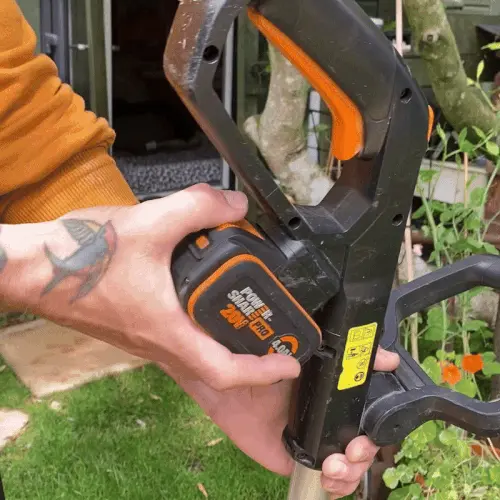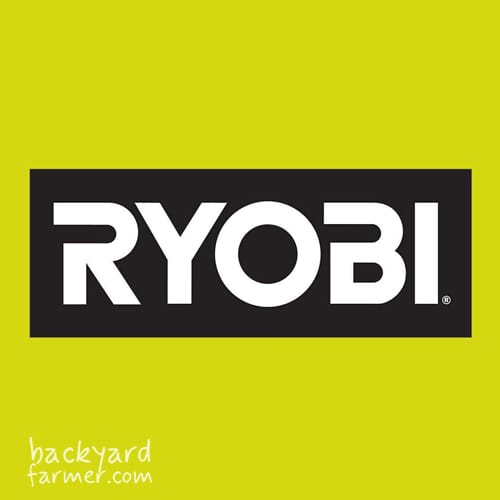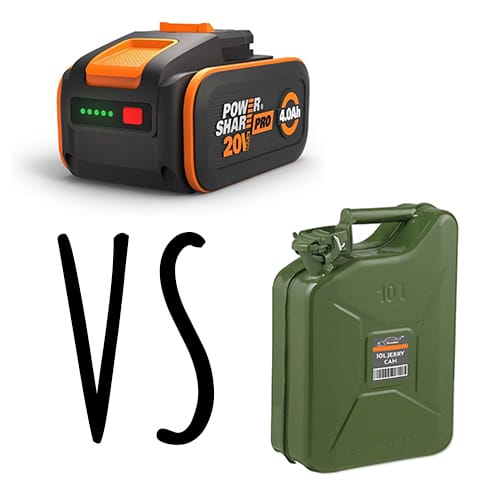Introduction: Choosing the Best Battery-Powered Garden Tools
The best battery-powered garden tools are transforming the way we maintain outdoor spaces. They provide a lightweight, eco-friendly, and low-maintenance alternative to petrol models, making gardening more accessible and efficient. Whether you’re a professional landscaper or a weekend gardener, the right cordless tools help you work smarter, not harder.
Why Trust This Guide?
As a professional gardener, I rely on garden tools every day and have tested various battery-powered brands firsthand. This guide is based on my real-world experience, offering practical insights to help you choose the best brand for your needs. For more information, see the About section here.

What Are the Best Battery-Powered Garden Tools?
The best battery-powered garden tools combine power, efficiency, and eco-friendliness. In this guide, we’ll compare leading brands based on their performance, durability, and affordability so you can make an informed decision.
My personal choice is Worx which I will discuss later on in the article. For more information about Wors as a brand in general, check out my article Are Worx Tools Any Good?
What You’ll Learn
This article explores the top battery-powered garden tool brands, focusing on:
- Performance – How powerful and reliable they are.
- Durability – Battery life and tool longevity.
- Affordability – Value for money and budget-friendly options.
Who Is This Guide For?
- Professionals who need dependable, heavy-duty tools.
- Home gardeners seeking convenience and ease of use.
- Budget-conscious buyers looking for quality tools without overspending.
What to Expect
We’ll break down the best battery-powered garden tools, examining key factors like battery life, power, and overall cost-effectiveness. By the end, you’ll have a clear understanding of which brand suits your gardening style—whether you need professional-grade durability or a budget-friendly option for occasional use.
Continue your battery tools & garden gear journey
- Are WORX tools any good – A broader look at the WORX battery ecosystem and how it compares to other battery platform tool systems
- Worx 20V battery review — is it worth the price? – Dive into one of the battery systems often referenced across cordless garden gear to help you understand performance and value
- Best cordless lawn mower UK guide – Compare battery-powered lawn mowers in the broader landscape to see how larger tools perform under battery systems
Are Battery-Powered Garden Tools Worth It?
Are battery-powered garden tools worth it? Thanks to major advancements in battery technology, modern cordless tools now deliver impressive power, longer run times, and faster charging speeds. As a result, they have become a practical alternative to petrol-powered options for many gardeners and professionals.
Advantages of Battery-Powered Garden Tools

- Lightweight & Easy to Handle – These tools are generally lighter than petrol models, reducing fatigue and making them more comfortable for extended use.
- Low Maintenance – No need for fuel mixing, spark plug replacements, or engine servicing—battery tools require far less upkeep.
- Eco-Friendly – Producing zero emissions, they leave a significantly smaller carbon footprint than petrol-powered alternatives.
- Quiet Operation – They run much quieter than petrol tools, making them ideal for noise-sensitive areas.
- Cost-Effective in the Long Run – While the upfront investment may be higher, you’ll save money on fuel and maintenance over time.
How Long Do Battery-Powered Garden Tools Last?
Battery-powered garden tools typically run between 30 to 90 minutes per charge, depending on battery capacity and power demand. However, the battery lifespan itself lasts 3-5 years before needing a replacement. Proper storage and maintenance can help extend battery longevity.
Potential Drawbacks to Consider
- Limited Run Time – Batteries require recharging, so having a spare battery can be essential for uninterrupted work.
- Less Power for Heavy-Duty Tasks – Although battery tools are getting stronger, petrol-powered tools still offer more torque for demanding jobs.
- Battery Replacement Costs – Over time, batteries degrade and need replacing, adding to long-term expenses.
Who Should Choose Battery-Powered Garden Tools?
- Home Gardeners – Ideal for small to medium-sized gardens with routine maintenance needs.
- Eco-Conscious Users – A great choice for those looking to reduce their environmental impact.
- Professionals with Lighter Tasks – Landscapers and gardeners who need quiet, portable tools for residential areas.
For most users, battery-powered garden tools provide convenience, efficiency, and sustainability. However, if you frequently handle heavy-duty landscaping tasks, petrol-powered tools may still be the better choice. If you’re still weighing the pros and cons, check out our battery vs. petrol garden tools comparison to determine which option best fits your needs.
Best Battery-Powered Garden Tool Brands Compared
Looking for the best battery-powered garden tool brands? Choosing the right one depends on your needs, budget, and the type of work you do. Some brands focus on affordability, while others prioritize power and durability. Below, we compare three top brands based on performance, durability, and value for money to help you make the best choice.
My Personal Choice: Worx
From my experience as a gardener, Worx is my go-to brand for battery-powered tools. They offer an excellent balance of quality, reliability, and affordability, making them ideal for both professionals and home gardeners. If you’re wondering whether Worx tools are worth it, check out my article, Are Worx Tools Any Good? for an in-depth look.
1. Best Overall Brand: Worx
Worx strikes the perfect balance between affordability and performance, making it a solid choice for both home gardeners and professionals.
Why Choose Worx?

- Interchangeable Battery System – Use the same battery across multiple tools for added convenience.
- Lightweight & User-Friendly – Designed to reduce fatigue and improve ease of use.
- Affordable Yet Reliable – Delivers high quality without the premium price tag.
Best for: Home gardeners and budget-conscious professionals who need dependable tools without overspending.
2. Best Professional Brand: Makita
Makita stands out as the go-to brand for professionals, offering unmatched durability, extended battery life, and a wide range of high-performance tools.
Why Choose Makita?

- High-Powered Performance – Built for heavy-duty tasks and demanding work environments.
- Long-Lasting Batteries – Efficient lithium-ion technology ensures extended run time.
- Durable & Weather-Resistant – Designed to withstand tough conditions, making it ideal for professional use.
Best for: Landscapers and professional gardeners who need powerful, durable tools that can handle intensive work.
3. Best Budget Brand: Ryobi
Ryobi is the top pick for homeowners and hobby gardeners who want cost-effective, battery-powered tools without sacrificing quality.

Why Choose Ryobi?
- Affordable & Widely Available – Offers great value and is easy to find in most stores.
- Decent Battery Life – Provides enough runtime for most household gardening tasks.
- Large Product Range – Compatible with a variety of tools, making expansion easy.
Best for: Homeowners and casual gardeners looking for budget-friendly, cordless gardening tools that still perform well.
What Is the Best Battery-Powered Garden Tool Brand?
The best brand depends on your gardening needs. If you want all-around reliability, Worx is a top choice. For high-performance tools, professionals prefer Makita. And if you’re looking for affordability without compromising quality, Ryobi is a fantastic budget-friendly option.
Final Thoughts
Each of these brands excels in different areas. If you need all-around reliability, go with Worx. If you’re a professional looking for high-performance tools, Makita is the best option. And if you’re on a budget but still want quality, Ryobi is a fantastic choice. No matter your gardening needs, there’s a battery-powered brand that fits your lifestyle.
Battery vs Petrol Garden Tools: Which Is Better?
When choosing between battery vs petrol garden tools, it’s essential to consider power, convenience, maintenance, and environmental impact. Each option has its strengths, so let’s break down the key differences to help you decide which one best suits your needs.
Gardening vs. Landscaping: What’s the Difference?
- Gardening involves routine maintenance tasks like mowing, trimming, weeding, and planting. These jobs typically require light to medium-duty tools.
- Landscaping covers large-scale projects such as tree removal, heavy digging, grading, and shaping terrain. These tasks often demand more powerful equipment.
Power & Performance
- Battery-Powered Tools: Ideal for light to medium tasks. Some high-end models handle tougher jobs, but they still don’t match petrol tools in raw power.
- Petrol Tools: Deliver higher torque and sustained power, making them the preferred choice for demanding landscaping work.
Weight & Ease of Use
- Battery-Powered Tools: Lighter, easier to maneuver, and great for reducing fatigue during extended use.
- Petrol Tools: Heavier due to engines and fuel tanks, requiring more effort to handle, especially for prolonged tasks.
Running Costs & Maintenance
- Battery-Powered Tools: Lower long-term costs—no need for fuel, oil, or frequent maintenance. However, batteries degrade over time and require replacement.
- Petrol Tools: Higher running costs due to fuel, oil, and regular servicing (e.g., spark plugs, air filters, and carburetor maintenance).
Noise Levels & Environmental Impact
- Battery-Powered Tools: Run much quieter and produce zero emissions, making them ideal for residential areas and eco-conscious users.
- Petrol Tools: Louder and emit harmful fumes, contributing to both noise and air pollution.
Comparison Table
| Feature | Battery-Powered Tools | Petrol Tools |
|---|---|---|
| Power Output | Medium to High | High |
| Weight | Light | Heavy |
| Noise Level | Quiet | Loud |
| Running Costs | Low | High |
| Maintenance | Minimal | Regular upkeep |
| Eco-Friendliness | Zero emissions | Emits CO₂ |

Are Battery-Powered Garden Tools Better Than Petrol?
Battery-powered tools are becoming more popular due to their low maintenance, eco-friendliness, and quiet operation. However, petrol tools still provide higher torque and unlimited runtime, making them the better choice for heavy-duty tasks. The best option depends on your needs and how often you use your tools.
Which One Should You Choose?
- Choose Battery-Powered Tools if: You need a quiet, eco-friendly, and low-maintenance option for home gardening or lighter professional use.
- Stick with Petrol Tools if: You need maximum power and long runtimes for heavy-duty tasks, large properties, or commercial landscaping.
A Gardener’s Perspective
From my experience, battery-powered tools are fantastic for everyday gardening tasks like trimming hedges, mowing lawns, and pruning. They’re light, easy to handle, and require little upkeep. However, when the work shifts to landscaping—such as cutting thick trees, digging, or clearing overgrown brush—petrol tools become necessary. Their extra power and ability to run continuously make them the better choice for large-scale, demanding jobs.
Ultimately, both options have their place. But with battery technology improving rapidly, more gardeners are making the switch for convenience, sustainability, and ease of use.
How to Choose the Right Battery-Powered Garden Tool
Wondering how to choose the right battery-powered garden tool? The best option depends on your needs, budget, and the type of tasks you handle. With so many choices available, focusing on key factors will help you get the best value and performance.
1. Battery Life & Compatibility
- Check the Voltage & Ah Rating: Higher voltage tools (e.g., 40V or 60V) offer more power, while amp-hour (Ah) ratings determine battery runtime per charge.
- Interchangeable Batteries: Some brands, like Worx, Makita, and Ryobi, offer universal battery systems, allowing you to use one battery across multiple tools.
- Charging Time: Consider how long the battery takes to recharge and whether you need spares to avoid downtime.
2. Power & Performance
- For Light Tasks (e.g., hedge trimming, lawn edging): Lower voltage tools (18V-36V) are sufficient.
- For Heavy-Duty Tasks (e.g., cutting thick branches, large-scale mowing): Higher voltage tools (40V-80V) provide the necessary power.
- Brushless Motors: These motors last longer, enhance efficiency, and reduce maintenance.
3. Tool Variety & Ecosystem
- Choose a Brand with a Broad Tool Range: Picking a brand with a wide selection of battery-powered tools lets you expand your collection without needing new batteries and chargers.
- Multi-Tool Systems: Some brands offer powerheads with interchangeable attachments (e.g., strimmer, hedge trimmer, tiller), reducing the number of tools you need.
4. Weight & Ergonomics
- Opt for a Lightweight Design: Lighter tools help reduce fatigue, especially during extended use.
- Consider Grip & Balance: Well-designed ergonomic handles improve comfort and ease of use.
5. Durability & Weather Resistance
- Prioritize Build Quality: Choose tools made from durable materials that can withstand outdoor conditions.
- Check for Water & Dust Resistance: Some professional-grade tools feature protective casings for better longevity.
6. Price & Warranty
- Set a Realistic Budget: Battery-powered tools range from budget-friendly homeowner models to high-end professional equipment.
- Check Warranty Coverage: A solid warranty on both the tool and the battery ensures long-term reliability.
What Should You Look for in a Battery-Powered Garden Tool?
The best battery-powered garden tool depends on battery life, power, and durability. Choosing a brand with interchangeable batteries and a broad tool range saves money and improves convenience.
Final Thoughts
The right battery-powered garden tool fits your gardening style, workload, and budget. Investing in a high-quality battery system with interchangeable batteries will save money in the long run and make your tools more versatile. Prioritize power, durability, and ease of use to get the most out of your cordless garden tools.
Frequently Asked Questions About Battery-Powered Garden Tools
Looking for answers about battery-powered garden tools? These cordless tools are quickly becoming the go-to choice for gardeners and professionals due to their convenience, low maintenance, and eco-friendliness. Below, we answer the most common questions to help you make an informed decision.
Most battery-powered tools run between 30 to 90 minutes per charge, depending on the battery’s capacity (Ah) and the tool’s power demand. Higher-end models with larger batteries (40V-80V) offer longer run times.
Yes! Many brands, including Worx, Makita, and Ryobi, offer interchangeable battery systems. This allows you to swap the same battery between multiple tools, saving money and increasing convenience.
Battery-powered tools have made significant advancements in power, but petrol tools still provide greater torque and sustained performance for heavy-duty tasks like felling trees or clearing dense brush. However, for home gardening and most professional tasks, modern battery tools deliver more than enough power.
On average, lithium-ion batteries last between 3 to 5 years or 500 to 1,000 charge cycles before their capacity declines significantly. To extend battery life, store them properly and avoid exposure to extreme temperatures.
Compared to petrol models, battery-powered tools require very little upkeep. Here are some key maintenance tips:
– Keep batteries charged but avoid overcharging.
– Store batteries in a cool, dry place to prevent degradation.
– Clean tools regularly to remove dirt and debris.
– Inspect moving parts periodically for signs of wear.
Most battery-powered garden tools are not waterproof, so avoid using them in heavy rain. However, some professional-grade models feature weather-resistant coatings for extra durability.
While the initial cost of battery-powered tools (including batteries and chargers) may be higher, they typically cost less over time. With no fuel expenses, minimal maintenance, and a universal battery system, they offer long-term savings.
The best voltage depends on your gardening needs:
– 18V-36V – Ideal for light-duty tasks like hedge trimming and lawn edging.
– 40V-60V – Suitable for mowing, pruning, and medium-duty jobs.
– 80V+ – Designed for heavy-duty work like cutting thick branches and dense brush.
Consider these factors:
– Battery Compatibility – Choose a brand with interchangeable batteries that work across multiple tools.
– Tool Variety – A broader selection allows you to expand your collection without buying new batteries.
– Performance & Durability – Look for well-reviewed brands known for reliability.
– Warranty & Customer Support – A strong warranty ensures peace of mind and long-term value.
Conclusion: Choosing the Best Battery-Powered Garden Tools
The best battery-powered garden tools are transforming outdoor maintenance, providing a cleaner, quieter, and more convenient alternative to petrol models. With advancements in battery technology, more gardeners and professionals are making the switch due to their efficiency, ease of use, and lower maintenance requirements.
Key Takeaways:
- Best Overall Brand: Worx – A top choice for home gardeners and professionals seeking quality and affordability.
- Best Professional Brand: Makita – Built for durability, power, and demanding tasks.
- Best Budget Brand: Ryobi – A great option for homeowners and hobbyists looking for value without sacrificing quality.
Battery-powered tools excel in light to medium gardening tasks, such as hedge trimming, lawn mowing, and pruning. However, for heavy-duty landscaping projects, petrol tools still offer greater torque and continuous runtime, making them better suited for intense workloads.
Should You Switch to Battery-Powered Garden Tools?
If you value eco-friendliness, reduced noise, and low maintenance, battery-powered tools are a fantastic choice. They provide sufficient power for light to medium-duty tasks, while interchangeable battery systems allow flexibility across multiple tools. However, if you frequently handle large-scale landscaping projects, petrol tools may still be the better option due to their higher power output and extended runtime.
Final Recommendation
If you prioritize sustainability, lower noise levels, and ease of use, battery-powered garden tools are a smart investment. Opting for a brand with an interchangeable battery system increases efficiency and long-term savings.
Whether you’re a home gardener looking for convenience or a professional landscaper seeking reliable performance, battery-powered tools are an excellent choice for modern outdoor work.







